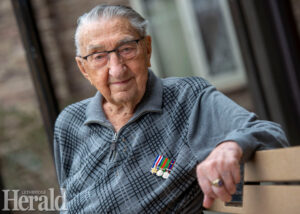Vivid memories remain for Second World War veteran
By Lethbridge Herald on November 10, 2020.
 Second World War veteran Peter Lewko served overseas as an army clerk through the war and after, helping with the administrative work to send the troops home. Herald photo by Ian Martens @IMartensHerald
Second World War veteran Peter Lewko served overseas as an army clerk through the war and after, helping with the administrative work to send the troops home. Herald photo by Ian Martens @IMartensHeraldTim Kalinowski
Lethbridge Herald
tkalinowski@lethbridgeherald.com
Second World War veteran Peter Lewko says his memories of that time in his life remain almost as vivid today as they were 75 years ago when the war ended.
Leaving a steady job with Canadian Pacific Railway, Lewko was 21 years old when he volunteered to join the army in 1941. Soon after receiving his military training, because he could drive, he became a driving instructor. He later joined the survey corps before being transferred over to railroad operations. He would have preferred either trade, but Lewko possessed another skill which was in even greater demand in the army at the time: he could type. He soon found himself assigned as a clerk to the railroad workshop, and would go on to spend the rest of his career in the army as a clerk at various posts.
Lewko went overseas to Colchester in England in 1942 and soon was transferred to Derby, and then on to Darlington. He was ensconced with 50 other clerks in an office which organized and prepared the necessaries to keep railway shipments of ammunition and other military supplies flowing toward the fighting men in various fields of combat. But that did not mean Lewko was completely safe in England.
“When we were at Colchester we were bombed because we were not too far from London,” he remembers. “You never thought about it. When you heard the bombs were coming you went down, and you’d go on the ground and say, ‘OK. Go ahead.’”
Lewko kept busy and kept his head down while stationed in England, but on June 6, 1944 even he was forced to look up from his paperwork and acknowledge the larger events that were happening around him.
“I remember D-Day,” Lewko says with quiet awe in his voice. “We were in Darlington at that time, and you saw all the aircraft going over. It was like mosquitoes going over, there were so many. We knew something big was happening.”
Once the Allies established a firmer foothold in Europe following that momentous day, Lewko’s headquarters moved across the English Channel.
“As soon as the army got far enough forward, we were taken from Darby and we went to Belgium into Bruges,” he confirms.
Lewko often drove out to do the mail run in nearby Ghent, but with the war still raging he was ordered not to go alone. But perhaps his closest calls during this time came once again from the sky.
“We got bombed a couple of times, but we were lucky,” he says. “Our headquarters in Belgium was in a Browning manufacturing plant where they built guns and stuff. The Germans came over and bombed us, and the bombs fell just on the other side of the fence. So we didn’t get hit.”
Lewko was still stationed in Belgium on VE Day, May 8, 1945, when the news came the war in Europe was finally over.
“I remember when we found out the war was over we were in Belgium,” he recalls. “I said, ‘Thank God. Now we can go home.’ It was a relief.”
But Lewko’s war wasn’t over. He was given orders to move forward to take up his next post with Canadian Army Headquarters in Germany to help complete all the much needed administration tasks and paperwork to begin demobilizing the soldiers to send them home.
It was in Germany, says Lewko, that the full impact and devastation of the war personally came home to him.
“You would go someplace the size of Coaldale or Lethbridge here, and there wouldn’t be a building standing,” he says.
They were also ordered to only go out in heavily armed groups of four to complete their tasks because many of Hitler’s most fanatical followers were still around, and still posed a potential threat to any lone soldier who might wander away from the main roads.
Thinking back on it all, Lewko has mixed feelings about his time in the war. On the one hand, he feels it was a war that had to be fought.
“I am not sorry I was over,” he says. “Look at Hitler who invaded all these different countries, and all the Jewish people he killed, that had to be stopped. And, I guess, the war was one way of doing it. I guess somebody had to do it. We did it, and that was it.”
On the other hand, looking around the world today, Lewko feels maybe humanity never really learned anything from the experience.
“The way I look at it is it seems to me the people in Africa,” he says by way of example, “certain groups there, they have no respect for life at all. To see all these refugee camps, and the people there, I wonder: did we ever accomplish anything? You see all these kids that don’t have anything. I have quite a respect for the flying doctors. They go over and help. They do eye surgery. They do the cleft lips, and stuff like that. They take a complete hospital unit with them. I think we need to do more of that. We need to help people.”
Lewko was one of the last Canadian soldiers to leave Germany at the end of the war, coming home in early 1946. After that, he returned to Canada and took up his old job at the CPR where he worked for the next 39 years until he retired.
Follow @TimKalHerald on Twitter
-1

